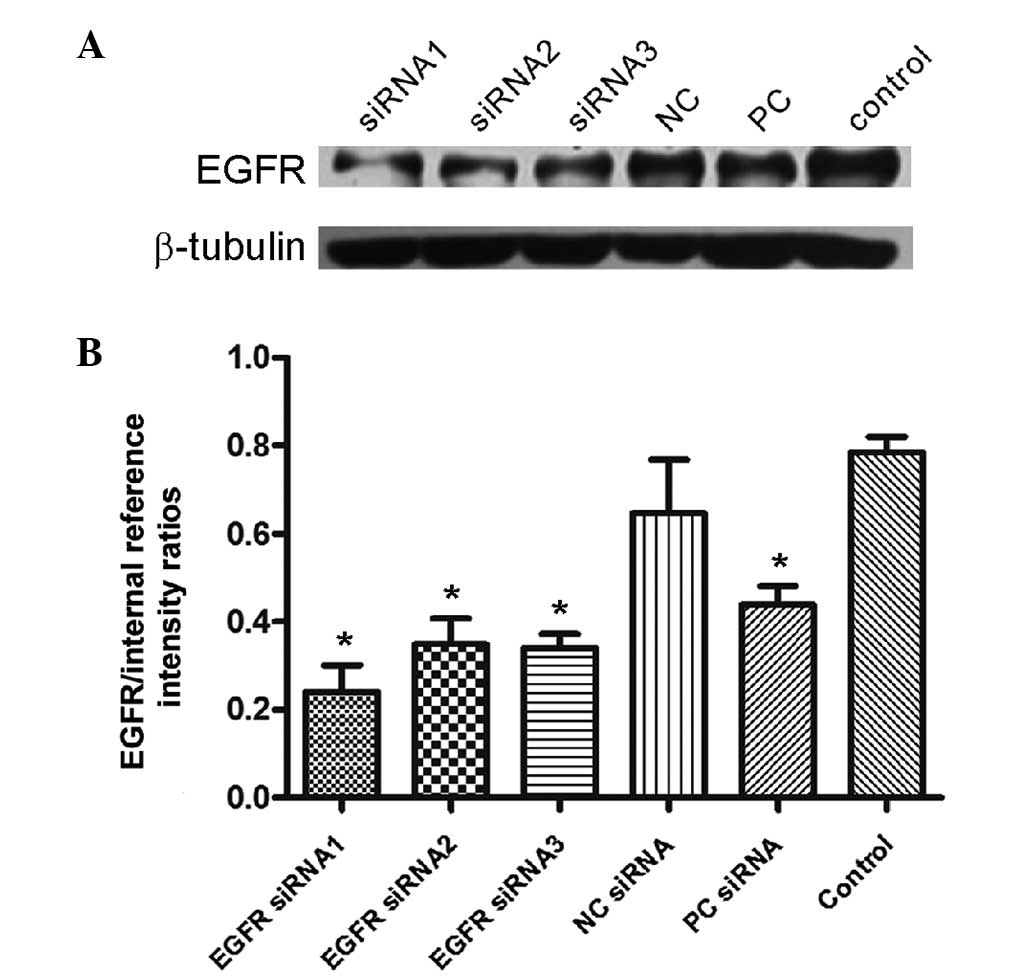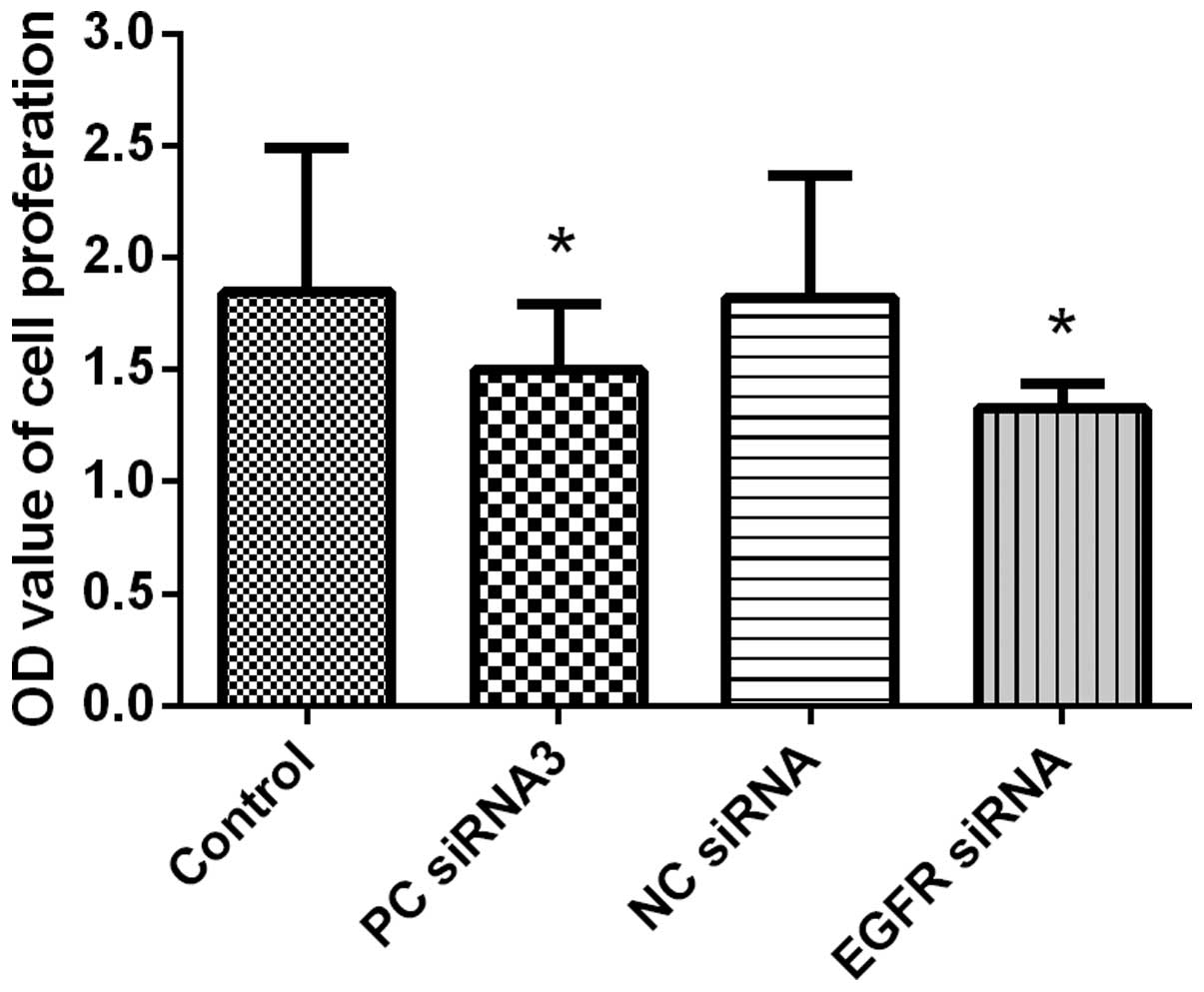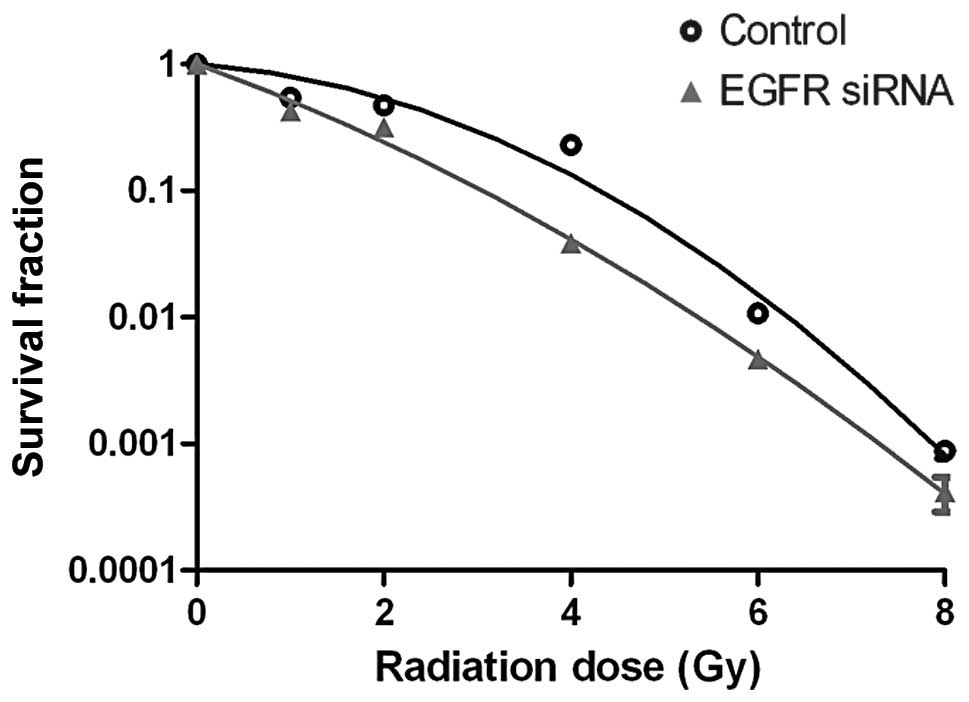|
1
|
Parkin DM, Bray FI and Devesa SS: Cancer
burden in the year 2000. The global picture. Eur J Cancer. 37
(Suppl 8):S4–S66. 2001. View Article : Google Scholar : PubMed/NCBI
|
|
2
|
Stoner GD, Wang LS and Chen T:
Chemoprevention of esophageal squamous cell carcinoma. Toxicol Appl
Pharmacol. 224:337–349. 2007. View Article : Google Scholar : PubMed/NCBI
|
|
3
|
Tatematsu N, Ezoe Y, Tanaka E, Muto M,
Sakai Y and Tsuboyama T: Impact of neoadjuvant chemotherapy on
physical fitness, physical activity and health-related quality of
life of patients with resectable esophageal cancer. Am J Clin
Oncol. 36:53–56. 2013. View Article : Google Scholar : PubMed/NCBI
|
|
4
|
Ayyappan S, Prabhakar D and Sharma N:
Epidermal growth factor receptor (EGFR)-targeted therapies in
esophagogastric cancer. Anticancer Res. 33:4139–4155.
2013.PubMed/NCBI
|
|
5
|
Akimoto T, Hunter NR, Buchmiller L, Mason
K, Ang KK and Milas L: Inverse relationship between epidermal
growth factor receptor expression and radiocurability of murine
carcinomas. Clin Cancer Res. 5:2884–2890. 1999.PubMed/NCBI
|
|
6
|
Lammering G: Molecular predictor and
promising target: Will EGFR now become a star in radiotherapy?
Radiother Oncol. 74:89–91. 2005. View Article : Google Scholar : PubMed/NCBI
|
|
7
|
Pai SI, Lin YY, Macaes B, Meneshian A,
Hung CF and Wu TC: Prospects of RNA interference therapy for
cancer. Gene Ther. 13:464–477. 2006. View Article : Google Scholar : PubMed/NCBI
|
|
8
|
Davis ME, Zuckerman JE, Choi CH, Seligson
D, Tolcher A, Alabi CA, Yen Y, Heidel JD and Ribas A: Evidence of
RNAi in humans from systemically administered siRNA via targeted
nanoparticles. Nature. 464:1067–1070. 2010. View Article : Google Scholar : PubMed/NCBI
|
|
9
|
Dorsett Y and Tuschl T: siRNAs:
Applications in functional genomics and potential as therapeutics.
Nat Rev Drug Discov. 3:318–329. 2004. View
Article : Google Scholar : PubMed/NCBI
|
|
10
|
Nozawa H, Tadakuma T, Ono T, Sato M, Hiroi
S, Masumoto K and Sato Y: Small interfering RNA targeting epidermal
growth factor receptor enhances chemosensitivity to cisplatin,
5-fluorouracil and docetaxel in head and neck squamous cell
carcinoma. Cancer Sci. 97:1115–1124. 2006. View Article : Google Scholar : PubMed/NCBI
|
|
11
|
Rodemann HP, Dittmann K and Toulany M:
Radiation-induced EGFR-signaling and control of DNA-damage repair.
Int J Radiat Biol. 83:781–791. 2007. View Article : Google Scholar : PubMed/NCBI
|
|
12
|
Pal SK and Pegram M: Epidermal growth
factor receptor and signal transduction: Potential targets for
anti-cancer therapy. Anticancer Drugs. 16:483–494. 2005. View Article : Google Scholar : PubMed/NCBI
|
|
13
|
Krause M, Prager J, Zhou X, Yaromina A,
Dörfler A, Eicheler W and Baumann M: EGFR-TK inhibition before
radiotherapy reduces tumour volume but does not improve local
control: Differential response of cancer stem cells and
nontumourigenic cells? Radiother Oncol. 83:316–325. 2007.
View Article : Google Scholar : PubMed/NCBI
|
|
14
|
Sunpaweravong P, Sunpaweravong S,
Sangthawan D, et al: Combination of gefitinib, cisplatin and 5-FU
chemotherapy and radiation therapy (RT) in newly-diagnosed patients
with esophageal carcinoma. J Clin Oncol. 25:46052007.
|
|
15
|
Safran H, Suntharalingam M, Dipetrillo T,
et al: Cetuximab with concurrent chemoradiation for esophagogastric
cancer: Assessment of toxicity. Int J Radiat Oncol Biol Phys.
70:391–395. 2008. View Article : Google Scholar : PubMed/NCBI
|
|
16
|
Ruhstaller T, Pless M, Dietrich D, et al:
Cetuximab in combination with chemoradiotherapy before surgery in
patients with resectable, locally advanced esophageal carcinoma: A
prospective, multicenter phase lB/II Trial (SAKK 75/06). J Clin
Oncol. 29:626–631. 2011. View Article : Google Scholar : PubMed/NCBI
|
|
17
|
Suntharalingam M, Dipetrillo T, Akerman P,
et al: Cetuximab, paclitaxel, carboplatin, and radiation for
esophageal and gastric cancer. J Clin Oncol. 24:40292006.PubMed/NCBI
|
|
18
|
Tomblyn MB, Goldman BH, Thomas CR Jr, et
al SWOG GI Committee: Cetuximab plus cisplatin, irinotecan, and
thoracic radiotherapy as definitive treatment for locally advanced,
unresectable esophageal cancer: A phase-II study of the SWOG
(S0414). J Thorac Oncol. 7:906–912. 2012. View Article : Google Scholar : PubMed/NCBI
|
|
19
|
Izquierdo M: Short interfering RNAs as a
tool for cancer gene therapy. Cancer Gene Ther. 12:217–227. 2005.
View Article : Google Scholar : PubMed/NCBI
|
|
20
|
Zhang M, Zhang X, Bai CX, Chen J and Wei
MQ: Inhibition of epidermal growth factor receptor expression by
RNA interference in A549 cells. Acta Pharmacol Sin. 25:61–67.
2004.PubMed/NCBI
|
|
21
|
Huo Q, Zheng ST, Tuersun A, et al: shRNA
interference for extracellular signal-regulated kinase 2 can
inhibit the growth of esophageal cancer cell line Eca109. J Recept
Signal Transduct Res. 30:170–177. 2010. View Article : Google Scholar : PubMed/NCBI
|
|
22
|
Vandersickel V, Maneini M, Marras E, et
al: Lentivirus-mediated RNA interference of Ku70 to enhance
radiosensitivity of human mammary epithelial cells. Int J Rediat
Biol. 86:114–124. 2010. View Article : Google Scholar
|



















